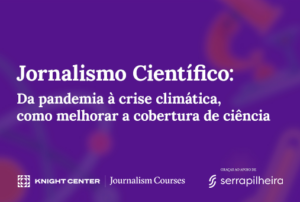Brazilian and other Portuguese-speaking journalists from around the world have a free online course at their disposal to help tackle the newsroom’s biggest stories.
“Science Journalism: From pandemic to climate crisis, how to improve science coverage,” is now available as a self-directed course on the Knight Center’s online learning platform, JournalismCourses.org.
 Course instructor and Brazilian science journalist Thiago Medaglia covers the environment, health and other science-related topics, teaching fundamental skills that will help reporters and editors improve their work when dealing with scientific issues.
Course instructor and Brazilian science journalist Thiago Medaglia covers the environment, health and other science-related topics, teaching fundamental skills that will help reporters and editors improve their work when dealing with scientific issues.
The self-directed course includes video lectures from Medaglia, as well as his interviews with experts in the field like Ana Carolina Moreno from TV Globo and Mercedes Bustamante from the University of Brasilia and the Brazilian Academy of Sciences.
There are also carefully curated readings, including the new Brazilian edition of the KSJ Science Editing Handbook, from the Knight Science Journalism Fellowship at the Massachusetts Institute of Technology. The Brazilian edition of the handbook was a project of the Knight Center for Journalism in the Americas with the support of the Serrapilheira Institute. It was translated to Portuguese and adapted by a team of Brazilian journalists: André Biernath, Juliane Duarte, Mariana Lenharo and Meghie Rodrigues. There was also a webinar announcing the ebook that included a discussion of the coverage of health and science topics by Brazilian journalists.
The course, supported by the Brazilian Serrapilheira Institute, originally ran from Oct. 11 to Nov. 7, 2021 as a Massive Open Online Course (MOOC). It attracted 2,378 students from 36 countries.
Once the course was over, Medaglia said students sent enthusiastic messages to him, which was especially meaningful because of how dense the course content was. “I consciously pushed to the limit in some of the modules, and the reason is that I think that we urgently need to address the gap between what we as journalists know about science and what the coverage really requires,” he said.
“We need more journalists actively engaging in conversations and exchanging information about science during their work. We need to build a strong community of journalists who have satisfactory knowledge about science, and we need it ASAP because we live in a world in crisis, and we have a huge responsibility as communicators. We need to be precise and effective, and that only comes with experience and studying.”
For him, the quality of discussions and interactions in the course was outstanding and he learned a lot himself.
“This exchange is one of the best parts and it is priceless,” he said.
One surprise came with the number of scientists who took the course.
“To me, that's a sign that we also need to invest in helping scientists develop communication skills. After all, we are all onboard the same giant floating rock in space and, with complimentary skills and roles, we are all active agents in producing and sharing knowledge,” Medaglia said.
In end-of-course evaluations, students praised Medaglia’s teaching style and the opportunity to develop professionally.
“I felt that Thiago Medaglia did an exceptional job, both in curating materials and conducting classes and interviews with experts,” one participant said.
Another first-time student of Knight Center MOOCs said, “I know I'm finishing the course with a bag full of references and knowledge.”
So, join these students and take this free online course on science journalism anytime and at your own convenience. But don’t wait too long, there’s scientific history being made every day!